10 Signs Of A Narcissist Friend & How To Deal With Them
From crossing boundaries to their need for control – here’s what to look out for.

Image: Shutterstock
Friendship is all about striking the right balance and sharing the good and bad parts of your life with your friend. However, the friendship may get toxic and exhausting if you have a narcissistic friend. A narcissist always demands special treatment; every conversation with them is one-sided. There is virtually no space for you in the friendship. However, not all narcissists have a narcissistic personality disorderi A mental health disorder where one has an inflated sense of self-worth and wants other people to always admire them. ; it is a spectrum. But being associated with a narcissist may affect your quality of life. If you feel your friend is more into themselves, check out the signs mentioned in the article to determine if your friend is a narcissist or not. Depending on the results, you may reassess your bond with him. Read on.
In This Article
Do Narcissists Have Friends?
Narcissists, being the way they are, may have acquaintances but struggle with genuine friendships. They prioritize their own needs, often lacking empathy and genuine connection-making energy. Their self-centered nature hinders them from forming amiable relationships, as they seek admiration rather than mutual understanding. Initially, they appear charming, but their interactions are often superficial, lacking the depth required for true friendship; trust crumbles as their manipulative tendencies surface.
Narcissists may exploit relationships for personal gain, which makes establishing sustained connections challenging. Consequently, their social circles tend to be trivial, revolving around their perceived status or utility rather than authentic bonds.
However, there are times when you may not be able to tell whether your friend has a narcissistic tendency, so it is best to be aware of the signs. Read below to know what they are.
10 Signs Of A Narcissist Friend
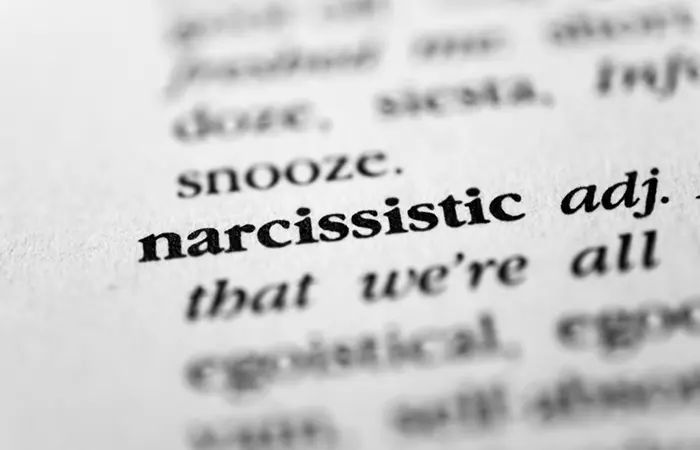
1. Boundaries? What’s That?
Narcissistic people do not respect boundaries.
They will tell you what to do, how to do, and try helping you out even if you haven’t asked for it. They do not care about your space and needs and will justify it as being a “good friend” and looking out for you.
2. Delusions Of Grandeur Is Their Signature Trait
They dream big and want all things grand – a movie star life, a huge model house, an array of the best cars, and everyone falling for them.
They are vain and want all the best things and are sure they will attain them in the next few years.
3. Their Blame Game Is On Point

A narcissistic friend will project their negative traits on you. They often say that their friend is needy, selfish, never apologizes, and has unreasonable expectations. They may belittle you in front of others. If they do something wrong, they blame it on you, and if you did something right, they don’t mind taking the credit.
4. They Look Down On Others
Narcissistic people have a sense of superiority. They tend to make you feel bad about yourself and try to compensate for their weakness by grandiosityi A symptom of narcissistic personality disorder characterized by an unrealistic sense of overconfidence and hostility. . They try to evaluate you negatively, which often turns into insulting behavior.
5. They Need To Control Everything
Their life, style, home, shoes – everything has to be in their control. This may also include your life, style, and shoes (if possible)! They are self-obsessed and think they know best about everything and feel so excited to ‘sort’ your life as well. The best part is that they think it is completely normal!
6. I’m Right, You’re Wrong!

Do your conversations always head this way? If yes, your friend is a narcissist. They believe they are never wrong with anything – even if they don’t know anything about the topic!
Narcissism causes disturbances in interpersonal relationships, which results in negative emotions. This graph shows that there is higher disharmony in relatives with narcissism than with non relatives. In the study, the participants were family members and romantic partners in a close and long-term relationship with individuals with pathological narcissism. The love and support was consistent between relatives and non-relatives but disharmony was more prevalent in relatives involving pathological narcissism. This highlights the complexities of breaking up with a narcissist and the emotional challenges involved.

Effect Of Narcissim On Relationships With Relatives And Non-Relatives
Source: Living with pathological narcissism: core conflictual relational themes within intimate relationships7. They Are Jealous
They get jealous about E.V.E.R.Y.T.H.I.N.G. They are jealous of anyone or anything that takes the focus off them. This is often because narcissistic people have low self-esteem, self-worth, and confidence. Their jealousy can often trigger their problematic behavior.
8. They Are Always The Best!
They have a positive view of themselves and always try to reflect their abilities to influence others. That is why narcissistic people perceive themselves as brutally honest, extroverted, conceited, and arrogant. Their self-absorbed nature and elevated sense of self makes them feel they are likable and reliable than others.
9. They Never Return Your Favors

Your favors for them as a friend are always unreturned. They will act like they are entitled to the ‘favors’ and always promise to return them. But promises for them seem like they were meant to be broken, so…
10. Fake It Till You Make It
Narcissistic people will try to fake everything to get their way. Some of them may live through others to boost their low self-esteem. Does your friend always push you for tasks or jobs that you are not at all interested in? And if you do as they say and receive compliments, they take the credit for everything (almost like shining in your reflection)? If yes, your friend is a narcissist.
 Quick Tip
Quick TipNarcissists often treat their friends the way a movie star would treat their fans because they are self-obsessed. Let’s understand in detail.
How Do Narcissists Treat Their Friends?

A narcissist friend will always think of themselves as superior than you. To maintain that, they may often belittle you and try to make you look inferior. They always want to be the center of attention and are very boastful and egotistical, so if you do not focus on them and follow their lead, they feel betrayed.
A narcissist friend will never be emotionally available for you. Such a relationship will leave you drained, filled with self-doubt and heartache. While it is better to stay away from such friends, if you want to try and help them, you may follow these tips.
A blogger talks about his experience with a narcissist friend and how it overall affected him. He shares in his blog post, “The second problematic thing was that she dominated every conversation we had (i).” He further recounts, “I slowly realized how she managed to isolate me from friends and acquaintances. She had skillfully managed to get me to place my primary focus on her and her book project.”
How To Deal With A Narcissist Friend

The best way is to talk to them – be direct and to the point. Let them know about your feelings and how their behavior is hurting you. Help them identify the narcissistic tendencies they have. Most of the time, narcissistic people are not able to identify the triggers and behavioral traits. If possible, take them to a therapist.
However, if nothing helps and the friendship takes a toll on your life and mental health, it is better to walk away from it. Before leaving, talk to them and explain why you want to stay away from them. Block all contact with them as they may hover, and you don’t want to get into it again! Keep yourself busy and connect with new friends.
 Quick Tip
Quick TipInfographic: Types Of Boundaries To Set For Self-Growth
The reason a lot of us find ourselves in difficult situations with narcissistic friends and acquaintances is due to not setting well-defined boundaries for ourselves. When you become more self-aware, you will be able to navigate such situations. Check out the infographic below to learn about the different types of boundaries you must set and be respectful of when dealing with others. Illustration: StyleCraze Design Team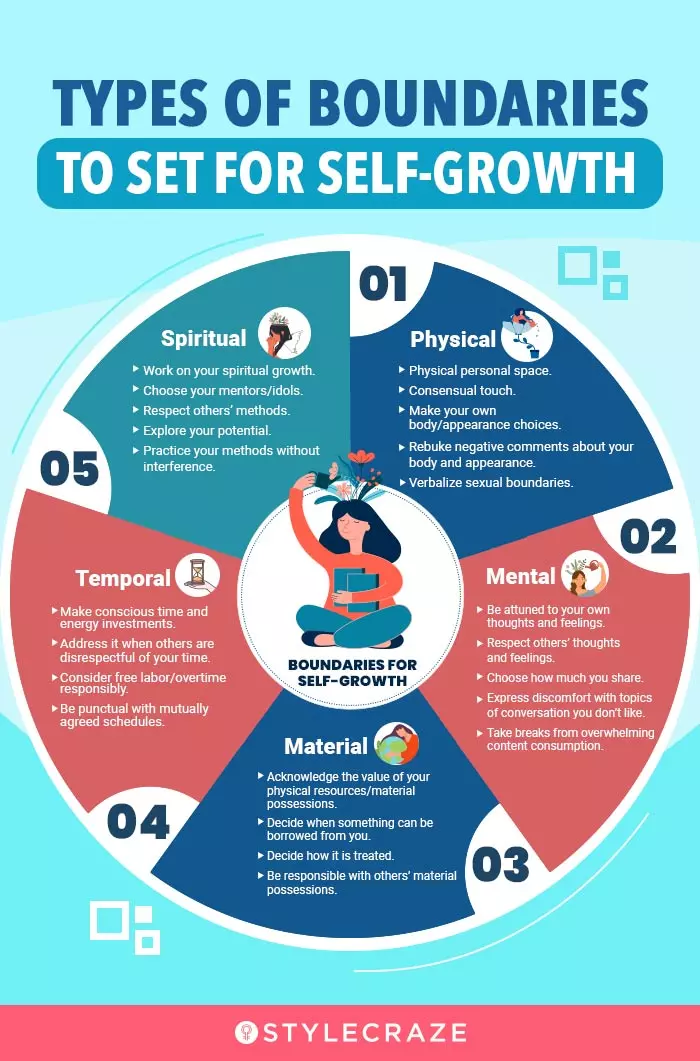
While dealing with a narcissistic friend may seem tough, the above tips and ideas can help you manage things better. Often, a narcissistic person is oblivious of the effects of their deeds and actions on other people. If you have such a friend, you may try and help them see some light. Help them identify their toxic traits and seek help in counseling or therapy if required. That may improve their self-important behavior and social demeanor over time. If they still refuse to change things about themselves, you may ultimately maintain a safe distance from them and their personal affairs.
Frequently Asked Questions
What happens when you ignore a narcissist friend?
If a narcissist friend is ignored, chances are high that they may become enraged and strive for more attention. They may adopt even toxic or abusive ways to grab your attention.
Do narcissists have lots of friends?
Yes, there are high chances that narcissists have lots of friends. However, these friendships don’t last long because of their narcissistic nature.
Why does a narcissistic friend give me the silent treatment?
A narcissistic friend gives you the silent treatment as a way to make you feel guilty, confused, stressed, and ashamed so that you cave into their demands. This may last until you give them what they want. You can respond to their manipulation by ignoring them to give them a taste of their own medicine, sharing your emotions, speaking up for yourself, and setting some boundaries.
Why does a narcissist stop talking?
Narcissists stop talking to you to punish you for not conforming to their ideas. This is their method of retaliating as they believe that such a step would make you desperate for contact with them and alter your views.
How do I punish a narcissist?
Attention is the lifeline of a narcissist. If you want to punish a narcissistic person, the best way is to stop paying attention to them.
Can a narcissist be a good friend?
Narcissists can have friends but they always have an ulterior motive with them. They might seek you out and even call you their best friend, but because of their nature, they try to control you and their lack of empathy might turn the friendship into a painful and abusive experience.
Why do I attract narcissistic friends?
It may be because you are empathic towards everyone and are sensitive to their problems. Narcissists are highly attracted to people with such personality traits. Hence, narcissists target you and open their bags of troubles around you.
What kind of friends do narcissists choose?
A narcissist befriends people who make them feel good about themselves, validate their feelings, overlook their flaws, and get easily manipulated.
How can a narcissistic friend affect my mental health and well-being?
A narcissistic friend might make you feel insecure about your looks and appearance. Continuous comments might lead to low self-esteem, confidence, and questioning of one’s self. Anxiety and depression may develop and you might seek validation for everything you do.
Is it possible to have a healthy relationship with a narcissistic friend?
It might be difficult or almost impossible to maintain a healthy relationship with a narcissistic friend. They make everything about themselves, always try to prove they are superior, and take your presence in their life for granted.
Key Takeaways
- A narcissistic friend is highly self-centered and always feels they are superior to you.
- They shift the blame on you when anything goes wrong and never respect your boundaries.
- They also belittle their friends and make them feel inferior.
- The best way to deal with a narcissistic friend is to confront them directly.
Illustration: Signs Of A Narcissist Friend & How To Deal With Them
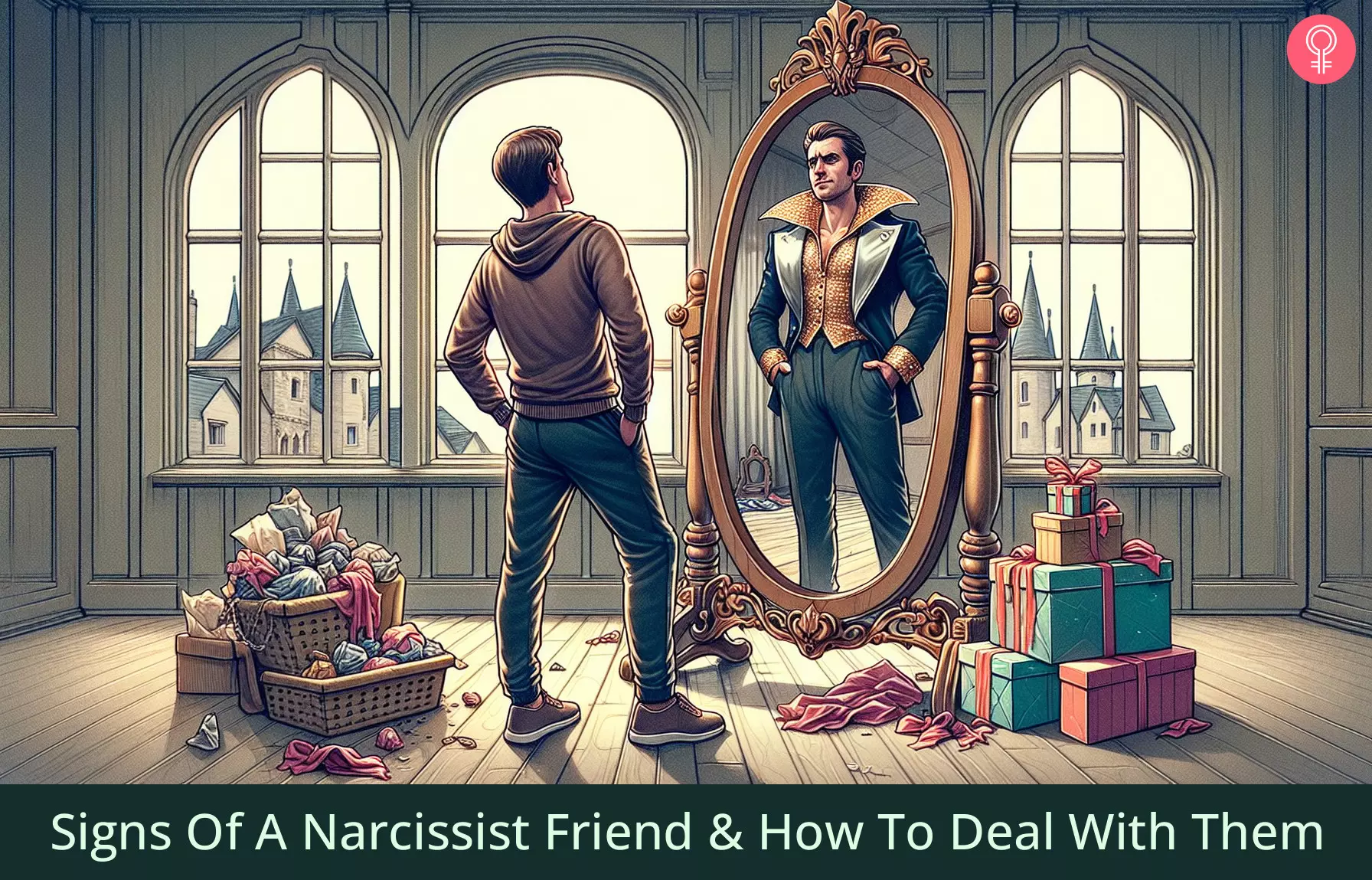
Image: Dall·E/StyleCraze Design Team
Do you have a friend who always talks about themselves, ignores you, and constantly seeks attention? You might be with a narcissist. Watch this video to learn the tell-tale signs.
Personal Experience: Source
StyleCraze's articles are interwoven with authentic personal narratives that provide depth and resonance to our content. Below are the sources of the personal accounts referenced in this article.
i. Narcissistic Abusehttps://bluejayblog.wordpress.com/2021/06/01/narcissistic-abuse/
Read full bio of Michele Waldron
Read full bio of Shatabdi Bhattacharya
Read full bio of Gazala Firdos Ansari








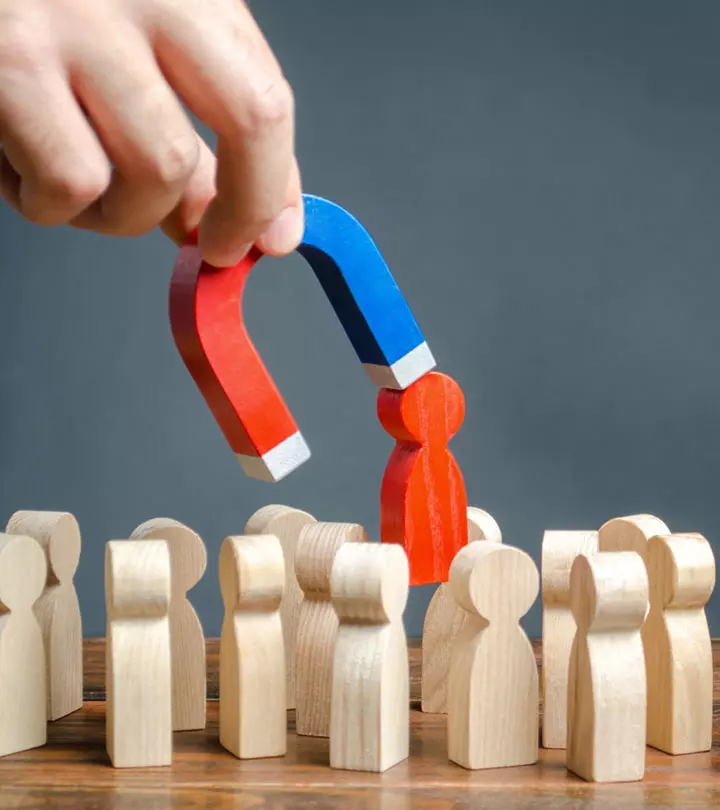














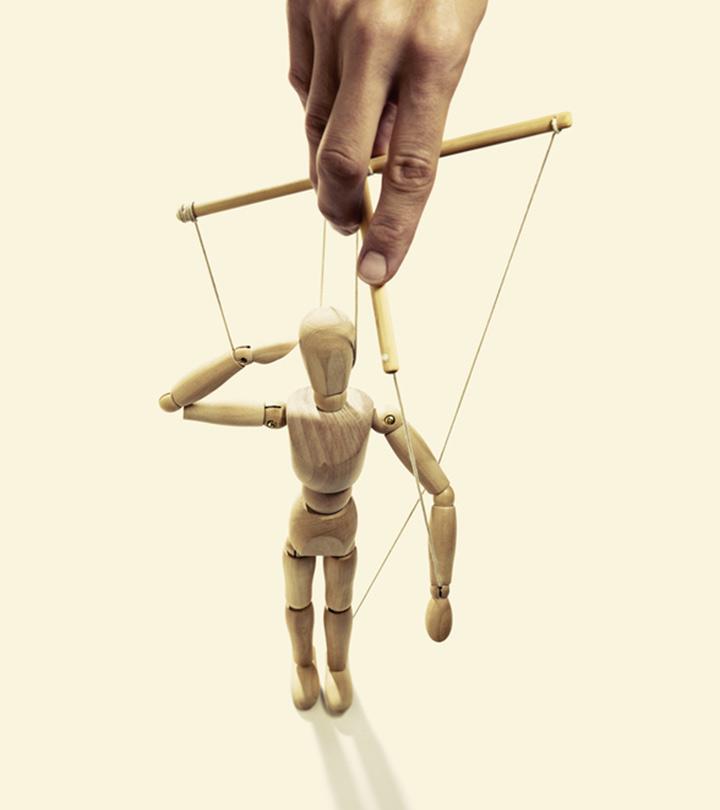
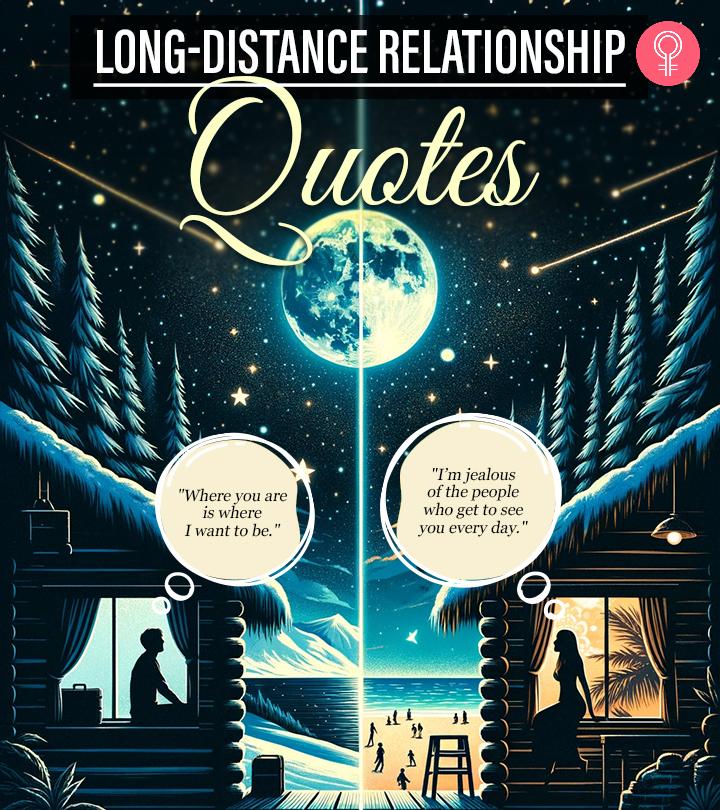

Community Experiences
Join the conversation and become a part of our empowering community! Share your stories, experiences, and insights to connect with other beauty, lifestyle, and health enthusiasts.